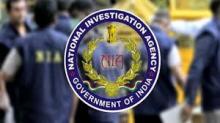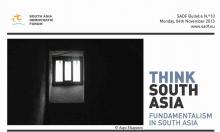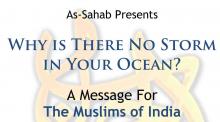-

"Indian Investigations Reveal Funding System for Promoting Jihad in Kashmir" , Terrorism Monitor (Jamestown Foundation) Volume: 12 Issue: 7, April 4, 2014.
-

The fake currency trade has been haunting Indian security establishments as well as economic intelligence agencies for quite a long time. Most recently, in February 2014, the finance minister of India informed the Upper House of Parliament (Rajya Sabha) that counterfeit Indian currency notes worth INR 107.33 crores (approximately US $ 17 million) have been seized between January 2010 and June 2013. If the intelligence agencies are to be believed, the FICNs are printed in Pakistan and brought to India through couriers via Bangkok, Kathmandu and Dhaka airports.
-

Al-Qaeda Leader al-Zawahiri Urges Jihad Against the “Anti-Islamic” Government of Bangladesh
Widespread violence, marked by protest rallies, hartals (general shutdowns), group clashes and bombings have led to massive confrontations between secular and Islamist forces in Bangladesh over the last year. Now, al-Qaeda leader Dr. Ayman al-Zawahiri has issued a call for jihad in Bangladesh, the fourth largest Muslim nation in the world.
-

Deba R Mohanty (Vice President, SSPC) has published a policy paper titled "Assertive but Flexible: India‘s Approach to Non-Proliferation and Export Control Regimes" (NFG Policy Paper Series, No. 02, December 2013), NFG Research Group, Asian Perceptions of the EU“, Freie Universität Berlin.
Policy Paper 2: Assertive but Flexible: India's Approach to Non-Proliferation and Export Controls
-

Indian analysts said the report could damage India's hopes of buying uranium from foreign suppliers following its 2009 civil nuclear agreement with the United States. The deal was aimed at helping India ease its power generation crisis while assuring the international community of its responsible stewardship. It provides for inspection 14 of its 22 nuclear plants and calls for its civil and military programmes to be kept separate.
-

The November 2013 (Vol.4 No. 11) Issue of 'Militant Leadership Monitor' features Animesh Roul (SSPC) 's article on the new Pakistani Taliban leader Maulana Fazlullah.
Jihadi Warlord of Pakistan: A Look at the Pakistani Taliban’s Newly Crowned Leader Maulana Fazlullah
-

A detailed study of the Indian Mujahideen, based on a clinical analysis of curated data, is beginning to pay dividends in understanding when the outfit will launch attacks and who its targets will be.
-

The reality so far in global geopolitics is ‘once a contested land, always a contested land’. The best example has been Jammu & Kashmir (J&K). Over 65 years have passed since the first batch of Pakistani intruders, with the help of army regulars, came face to face with the Indian army, and the violence continues unabated in the J&K. Since then, India and Pakistan have fought at least three major wars and as many skirmishes, with intermittent, mostly half-hearted and ineffective bilateral peace overtures from both sides.
-

A wave of violent clashes that swept Myanmar’s restive Rakhine State (formerly known as Arakan) in late September left at least five Muslims dead and many members of their community injured and displaced. The epicenter of the violence was the city of Thandwe, which was targeted by a Buddhist mob (Mizzima News [Yangon], October 3). For some time now, Buddhist nationalist groups in Myanmar have opposed Muslim businesses and social practices, creating a sense of mistrust and antagonism between the two communities that frequently erupts in violence.
-

Al Qaeda has struggled in the past to gain the support of India’s vast Muslim population. But that’s gradually changing, warns Animesh Roul. Today, he outlines how the fragmented organization is trying to attract money and manpower from the third largest Muslim community on the planet.
Paxton ported to drupal by DropThemes.in